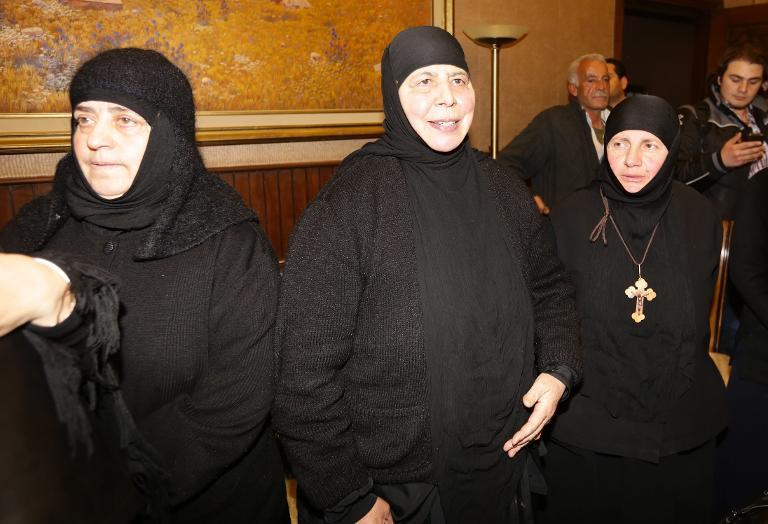
Rebels seized the 13 nuns and three maids on December 3 from the famed Christian village of Maalula -- where residents still speak the ancient Aramaic of Jesus Christ -- and took them to the nearby town of Yabrud.
The women, who arrived after midnight at the regime-held town of Jdeidet Yabus near the border with Lebanon, were exhausted but full of praise for those who negotiated their release.
"We want to thank God, who made it possible for us to be here now. We thank (Syria's) President Bashar al-Assad for being in contact with the emir of Qatar" Tamim Bin Hamad al-Thani, one of the nuns told reporters.
"We will not forget the honest mediator, Abbas Ibrahim," she added, in reference to Lebanon's General Security agency director.
Seated as she spoke, and dressed in her black religious habit, the nun said all 16 hostages were treated "well" in captivity.
The kidnappers, rebel fighters from the Al-Qaeda-affiliated Al-Nusra Front, "were giving us everything we asked for", she said.
"No one bothered us," she added, denying rumours their kidnappers had forced the group of Syrian and Lebanese nuns to remove their crosses.
The nuns will be officially welcomed home Monday at the Greek Orthodox Patriarchate in Damascus.
They arrived at Jdeidet Yabus after an arduous nine-hour journey that took them from Yabrud into Lebanon, then back into Syria via the official crossing.
Their release comes amid fierce fighting around Yabrud near the Lebanese border, months into a campaign by the army -- backed by Lebanon's powerful Shiite movement Hezbollah -- aimed at crushing rebel positions.
A Britain-based monitoring group said meanwhile that some 150 women who had been held in Syria's jails were on board four buses at the Lebanese-Syrian border, after being set free in exchange for the nuns.
"A woman and her four children who had been in jail were freed first and reached Yabrud," said Rami Abdel Rahman of the Syrian Observatory for Human Rights, describing the initial release as "a gesture of goodwill" by Assad's regime.
"One hundred forty-nine other women prisoners are now with Lebanon's General Security agency after being freed from Syrian jails, in accordance with the deal," he told AFP.
But a security official said he could not confirm whether the prisoners had yet been freed.
Tens of thousands of people, including hundreds of children, are being held in Syria's jails, where torture and ill-treatment are systematic, rights groups say.
Sema Nassar, a Syrian human rights activist who works on the issue of detainees, said she fears some of the released prisoners may face re-arrest in future should they return to Syria.
"In previous operations of this kind, women who have been released have only been detained again a couple of weeks later," she told AFP.
The release came as Amnesty International issued a report that said the Syrian army has been using starvation as a "weapon of war" in its siege of a Palestinian refugee camp on the outskirts of Damascus.
The New York-based rights watchdog said nearly 200 people had died since the army siege of the Yarmuk camp was tightened in July 2013 and access to food and medicine cut.
"Life in Yarmuk has grown increasingly unbearable for desperate civilians who find themselves starving and trapped in a downward cycle of suffering with no means of escape," said Amnesty's Philip Luther.
Amnesty said the siege of Yarmuk was "the deadliest of a series of armed blockades of other civilian areas, imposed by Syrian armed forces or armed opposition groups on a quarter of a million people across the country."
Syrian troops have laid siege to the camp as near-daily battles rage between rebels and pro-regime fighters in the sprawling southern Damascus suburb.
The violence has prompted the exodus of tens of thousands of Yarmuk's 170,000 residents. Some 20,000 are still trapped inside the camp, facing hardship and hunger, according to the UN refugee agency UNRWA.
This month marks the third anniversary of the March 15 peaceful Arab Spring-inspired uprising against President Assad's ironclad rule that was met by a brutal crackdown, triggering a civil war.
More than 140,000 people have been killed in the conflict, another 2.5 million Syrians have fled across the borders and a further 6.5 million are displaced inside the devastated country.










1732354127-0/Untitled-design-(3)1732354127-0-270x192.webp)






COMMENTS
Comments are moderated and generally will be posted if they are on-topic and not abusive.
For more information, please see our Comments FAQ